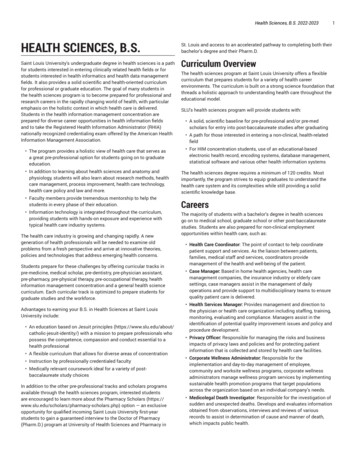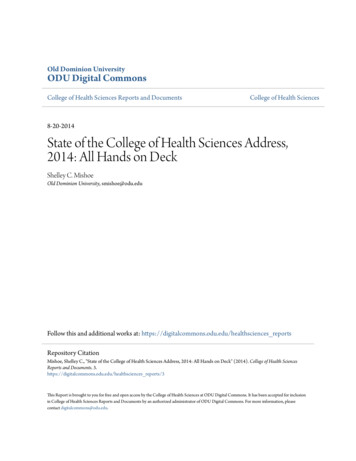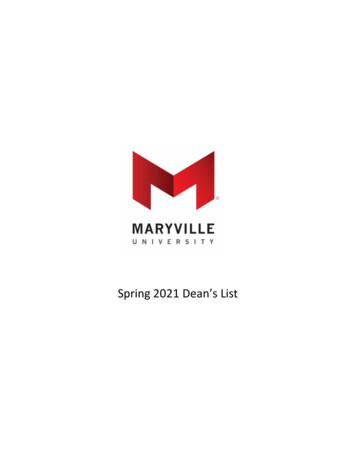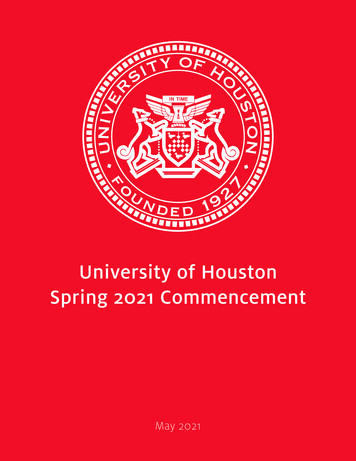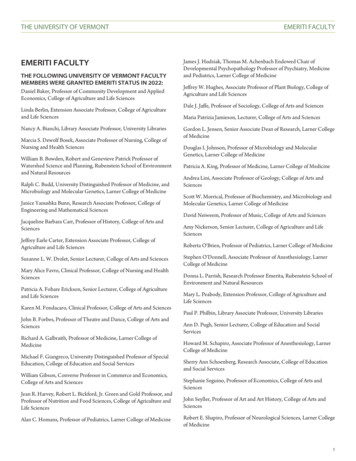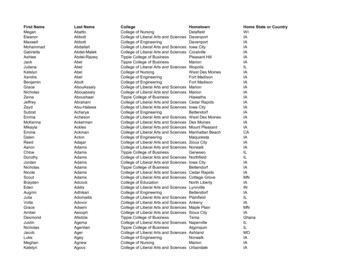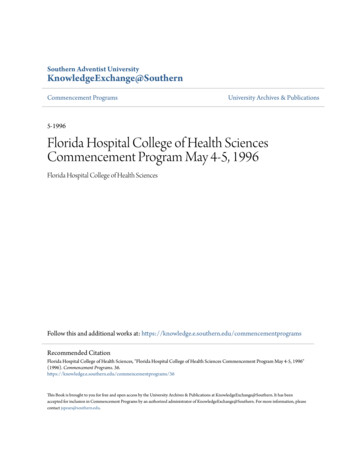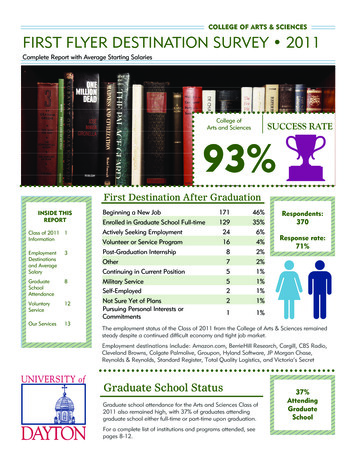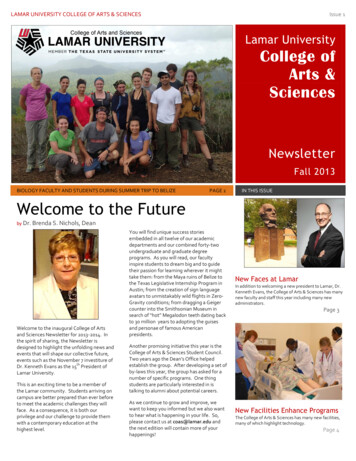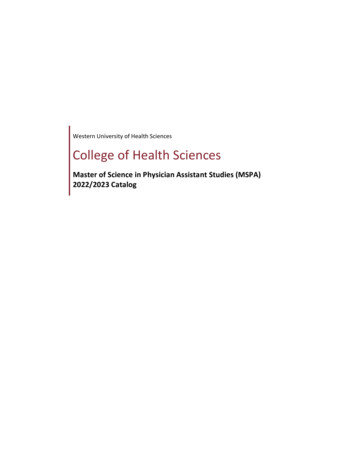
Transcription
Western University of Health SciencesCollege of Health SciencesMaster of Science in Physician Assistant Studies (MSPA)2022/2023 Catalog
COVID-19 ImpactThe contents of this 2022-2023 catalog reflect standard operating conditions for the academic year.However, the global COVID-19 pandemic has resulted in a rapidly changing environment for highereducation, and Western University of Health Sciences will respond to those changes in the interest of thehealth and well-being of all our students, faculty, staff, and administration. Changes to COVID-19 Vaccinepolicy, procedure and practice may be necessary from time to time, and these changes will be publishedusing typical communication channels, including mail, email, publication to the university web site, pressreleases, and other channels as deemed appropriate. These changes may supplement and supersede anyinconsistent provisions found in this Catalog.2 P a ge
Table of ContentsCOVID-19 Impact . 2College of Health Sciences . 7Mission. 7Goals . 7Master of Science in Physician Assistant Studies . 8Accreditation . 8General Information . 8Mission Statement . 8Vision . 8The Physician Assistant Role . 8Certification/Licensure. 9Program Learning Outcomes. 10Functions and Tasks of PA Graduates . 11Personal Competencies for Admission and Matriculation . 12Observation . 12Communication . 12Motor . 12Intellectual, Conceptual, Integrative, and Quantitative Abilities . 13Behavioral and Social Abilities. 13Ethical Standards . 13Admissions Policies and Procedures . 14Non-Discrimination Policy . 14Reasonable Accommodation for Disabilities. 14Application Requirements. 14Application Procedures and Deadlines . 16Acceptance Deposit . 17Linkage Program(s) . 17International Applicants. 18Transfers from Other Schools . 18Registration . 193 P a ge
Registration Late Fee Appeals . 19Student Health Insurance Requirement . 19New Student Orientation/Welcome Week . 19Student Initiated Changes in Enrollment Status. 19Full-Time/Part-Time Status . 20Time Limits . 20Tuition and Fees . 21Other Fees and Expenses . 21Additional PA Program Education Requirements. 21Classroom Audience Response System . 21Modified Curriculum/Repeated Coursework Tuition Rates . 22General Academic Policies and Procedures . 23Academic Advisement . 23Attendance/Absences . 23Student Behavior during Examinations . 24Zoom Policies and Procedures . 25Zoom Lecture and Lab Policy and Procedure . 25Zoom Exam Proctoring Protocol . 25Children in the Classroom/Labs. 27Communications: Lockers, Email, Mail, Telephone . 27Practice Partners . 27Returning from Leave of Absence While in Phase II or Phase III . 28Protocol for Input on Matters of Student Concern . 28Standards of Academic Integrity, Professionalism and Student Conduct . 29CHS Student Conduct Committee (CHS-SCC) . 29Reporting Alleged Violations/CHS-SCC Investigation Procedure . 29Hearing by CHS-SCC . 30Information for Students about Hearings Involving Alleged Violations of the Standards ofAcademic Integrity, Professionalism and Student Conduct . 30Status of Student Pending Action . 30Appeals Procedures . 30Procedures Pending Appeals Outcome . 304 P a ge
Additional Information. 31Standards of Academic Progress . 32Phase I . 32Phase II (Didactic and Clinical). 32Phase II and Phase III (Clinical) . 33Student Progress Committee . 33Promotion . 34Graduation . 34Adverse Actions . 35Clinical Education . 40Required Clinical Education Rotations . 40Out-of-Area Clinical Education . 40Clinical Rotation Education Assignment . 41Clinical Rotation Education Assignment Appeal. 41Reassignment of Clinical Rotation Education . 41Rotational Clinical Education Observation . 41Personal Appearance . 41Professional Conduct During Clinical Education. 42Confidentiality of Medical Record and Health History Information . 43Patient Records - Physician Review and Countersignature . 43Title Identification/Representation . 44Evaluation and Grading . 45Evaluation Methods . 45Grading Scale . 47Clinical Rotation Education Grading Criteria . 47Audit . 47Missing Grades . 47Incomplete Grades. 47Appealing a Course Grade . 48Appealing a Clinical Education Grade . 48Credit Hour Calculation . 49Curriculum Organization . 505 P a ge
Year 1 . 50Year 2 . 51Course Descriptions . 52Honors and Awards . 58Academic Calendar . 59The Physician Assistant Oath . 606 P a ge
College of Health SciencesMissionThe mission of the College of Health Sciences parallels the humanistic traditions of Western University ofHealth Sciences. We are a team of educators, clinicians, and researchers who prepare graduates toimprove the health and well-being of all populations.Goals1. To educate an allied health workforce that helps to meet the healthcare and educational needsof the State of California and the west.2. To achieve an environment and culture that supports all members of the College.3. To ensure an environment and culture that empowers all persons in the College to maximizetheir potential as contributing members in the education of students, in research and clinicalactivities, and in service to the community.7 P a ge
Master of Science in Physician Assistant StudiesDepartment of Physician Assistant EducationAccreditationThe Accreditation Review Commission on Education for the Physician Assistant (ARC-PA) has grantedAccreditation-Continued to the Western University of Health Sciences Physician Assistant Programsponsored by the Western University of Health Sciences. Accreditation-Continued is an accreditationstatus granted when a currently accredited program complies with the ARC-PA Standards.Accreditation remains in effect until the program closes or withdraws from the accreditation process oruntil accreditation is withdrawn for failure to comply with the Standards. The approximate date for thenext validation review of the program by the ARC-PA will be March 2023. The review date is contingentupon continued compliance with the Accreditation Standards and ARC-PA policy.The program's accreditation history may be viewed at: -university-of-health-sciences/.General InformationMission StatementThe Department of Physician Assistant Education supports the University’s mission by educating PhysicianAssistants to deliver high quality, competent, and compassionate health care as team members within thehealth care delivery system.VisionThe Western University of Health Sciences Department of Physician Assistant Education will be nationallyrespected and recognized as an innovative leader in Physician Assistant education. Our faculty willcontinue to be leaders in our profession as educators and clinicians. Our faculty will continue to educatea diverse student body, who will provide compassionate and comprehensive primary care medicine.The program will continue to foster student attributes that will enhance their role as effective health careprofessionals.Our students, graduates, and faculty will continue to serve in key leadership positions on a local, state,and national level, to influence the future of the physician assistant profession, while striving to continuepersonal and professional development. Physicians and health care delivery teams will seek ourgraduates. Through these partnerships, comprehensive patient care will be accessible for all populations.The Physician Assistant RolePhysician Assistants (PA) are health care professionals who are authorized by a state to practice medicinein collaboration with physicians and other healthcare providers. PAs are certified by the NationalCommission of Certification of Physician Assistants and are licensed, certified, or registered in the state inwhich they practice. PAs deliver a broad range of medical and surgical services including conductingphysical exams, obtaining medical histories, diagnosing, and treating illness, ordering, and interpretingtests, counseling on preventive health care, assisting in surgery, and prescribing medications.8 P a ge
The role of the PA demands intelligence, sound judgment, intellectual honesty, appropriate interpersonalskills, and the capacity to react to emergencies in a calm and reasoned manner. An attitude of respect forself and others, adherence to the concepts of privilege and confidentiality in communicating with patients,and a commitment to the patient's welfare are essential attributes.The specific tasks performed by an individual PA cannot be delineated precisely because of variations inpractice requirements mandated by geographic, political, economic, and social factors. At a minimum,however, PAs are educated in biomedical science, critical clinical reasoning, and patient education. PApractice is characterized by clinical knowledge and skills in the areas traditionally defined as familymedicine, internal medicine, pediatrics, obstetrics, gynecology, surgery, and psychiatry/behavioralmedicine.PAs practice in inpatient, outpatient, and long-term settings. They provide health care services to diversepatient populations of all ages with a range from acute to chronic medical and surgical conditions. PAsacquire knowledge and skills, which allow them to function effectively in an ever-changing health careenvironment.Services performed by physician assistants include, but are not limited to the following:1. Evaluations: eliciting a detailed and accurate history, performing an appropriate physicalexamination, ordering appropriate diagnostic studies, delineating problems, developingmanagement plans, and recording and presenting data.2. Diagnostics: ordering, performing, and/or interpreting diagnostic studies to identify and followpathophysiology process.3. Monitoring: implementing patient management plans, recording progress notes, andparticipating in the process of the continuity of care.4. Therapeutic: performing therapeutic procedures and managing or assisting in the managementof medical and surgical conditions, which may include assisting in surgery and taking initiative inperforming evaluations and therapeutic procedures in life-threatening procedures.5. Patient Evaluation: counseling patients regarding issues of health care management to includecompliance with prescribed therapeutic regimens, normal growth and development, familyplanning, and emotional problems of daily living.6. Referral: facilitating the referral of patients to other health care providers or agencies asappropriate.Certification/LicensureThe written examination for certification as a physician assistant is administered by the NationalCommission on Certification of Physician Assistants (NCCPA). Successful completion requires that theapplicant achieve the passing score established by the NCCPA for that examination. It is the responsibilityof the applicant to ensure that certification of their examination score is received by the PhysicianAssistant Board (PAB). The NCCPA phone number 678-417-8100 and their website address ishttp://www.nccpa.net/. The PAB phone number is 916-561-8780 and their website ishttp://www.pab.ca.gov.9 P a ge
To practice as a physician assistant in California, one must apply for and receive licensure from thePhysician Assistant Board (PAB) and pass the Physician Assistant National Certification Exam (PANCE). ThePAB does not issue interim permits to practice as a PA.Program Learning OutcomesThe primary goal of the WesternU Physician Assistant Program is to educate individuals to serve asproviders with a basis in primary care medicine. PA students are educated to provide health care to allpatient populations. PAs work collaboratively with physicians and other healthcare providers as outlinedby the law. The education provided by the program will prepare the entry-level graduate with theknowledge, skills, and attitudes to perform in a primary care setting and function in a variety of roleswithin numerous clinical settings. Educating individuals to serve as PAs in primary care medicine isfounded on the understanding that the broad-based education needed to prepare an individual to servein a primary care setting is the most effective form of initial preparation. Primary Care education alsopermits the development of attributes that will serve the graduate in the greatest spectrum of potentialemployment opportunities.PA students must demonstrate:1. Competency in established and evolving core medical and clinical sciences knowledge with anapplication to patient care in diverse settings. (Medical Knowledge)2. Interpersonal and communication skills that result in effective information exchange withpatients, families, health care providers, professional associates, and the health care system.(Communication Skills)3. Care that is effective, patient-centered, compassionate, timely, efficient, and equitable for thetreatment of health problems and the promotion of wellness. (Patient Care Knowledge)4. A high level of responsibility, ethical practice, sensitivity to a diverse patient population, andadherence to legal and regulatory requirements. (Professionalism)5. An ability to analyze critically, evaluate, and improve patient care practices throughout theirongoing education and practice. (Critical Thinking) (Exposure to Life-Long Learning)6. An awareness of and responsiveness to the larger system of health care to provide patient carethat is of optimal value. (Collaboration)The program has also incorporated elements of osteopathic philosophy into PA education. Theseelements include:1. Caring for, and appreciation of, the patient as a whole person.2. Emphasis on those aspects of health education that stress health promotion and diseaseprevention.3. An appreciation of the role of physical assessment in the diagnosis and management of illness.The curriculum is designed to accomplish the preceding goals. Students attain these goals as theyprogress through the curriculum.10 P a g e
Functions and Tasks of PA GraduatesGeneral Entry-Level Competencies Expected of a GraduateThe PA graduate will be able to: Elicit a comprehensive history and perform a complete routine physical examination on patientsof any age group; elicit a pertinent and accurate history and perform a problem-oriented physicalexamination in situations requiring an interval evaluation. Select, perform, and/or interpret the appropriate routine patient laboratory and diagnosticstudies/procedures. Identify patient problems, organize, and integrate data, and record patient findings. Accurately present an oral case. Implement a management plan. Instruct and counsel patients regarding physical and mental health to include diet, healthmaintenance, therapy, normal growth and development, family planning, referral, and follow-upservices. Provide life support and emergency evaluation/care in response to life-threatening situations inthe absence of a physician and/or other appropriate health professionals. Initiate and follow up on appropriate referrals to specialists.11 P a g e
Personal Competencies for Admission and MatriculationA candidate for admission to the PA program must possess, or be able to achieve through a reasonableaccommodation, certain sensory and motor functions, that would enable the individual to carry out theactivities described in the sections that follow. Upon matriculation to the program, the student mustcontinue to possess, or be able to achieve through reasonable accommodation, the personalcompetencies outlined below throughout their progression in the PA program. Graduation from theprogram signifies that the individual is prepared for entry into clinical practice or into postgraduatetraining programs. Therefore, it follows that graduates must have the knowledge and skills needed tofunction in a broad variety of clinical situations and to render a wide spectrum of diagnostic andtherapeutic care. The candidate must be able to integrate - consistently, quickly, and accurately - allinformation received by whatever sense(s) are employed. In addition, they must have the intellectualability to learn, integrate, analyze, and synthesize data.This program requires the performance of specific essential functions, which include, but are not limitedto, the following: observation; communication; motor; intellectual, conceptual, integrative, andquantitative; and behavioral and social.For candidates or students who require reasonable accommodation(s) to meet the competencies outlinedbelow, please contact the Harris Family Center for Disability and Health Policy (HFCDHP) at (909) 469-5297.Under all circumstances, a candidate or student should be able to perform the following in a reasonablyindependent manner, with or without reasonable accommodation:ObservationCandidates and students ordinarily must have sufficient vision to be able to observe demonstrations,experiments, and laboratory exercises. They must be able to observe a patient accurately at a distanceand close at hand.CommunicationCandidates and students must be able to communicate sensitively in English, orally and in writing, withpatients, family members, and colleagues. Candidates and students must be able to interpretcommunication of others effectively. They must possess functional hearing. Candidates and students mustalso be able to recognize and respond to soft voices or voices under protective garb, auditory timers,equipment/emergency alarms, joint noises, and to use devices for the measurement of vital signs, cardiac,and breathe sounds effectively. Candidates and students must be able to read, write, and speak English.MotorCandidates and students should have sufficient motor function such that they are able to executemovements reasonably required to provide general care and emergency treatment to patients. Examplesof emergency treatment reasonably required of PAs are cardiopulmonary resuscitation, administration ofintravenous medication, application of pressure to stop bleeding, opening of obstructed airways, suturingof simple wounds, performance of simple obstetrical maneuvers, and movement of patients. Theseactions require coordination of both gross and fine muscular movements, equilibrium, and functional useof the senses of touch, hearing, and vision.12 P a g e
Intellectual, Conceptual, Integrative, and Quantitative AbilitiesThese abilities include measurement, calculation, reasoning, analysis, and synthesis. Problem solving, thecritical intellectual skill demanded of a physician assistant, requires all these intellectual abilities. Inaddition, candidates and students should be able to comprehend three-dimensional relationships andunderstand the spatial relationships of structures.Behavioral and Social AbilitiesCandidates and students must possess the emotional health required for full utilization of the intellectualabilities, the exercise of good judgment, the prompt completion of all responsibilities attendant to theassessment and care of patients, and the development of mature, sensitive, and effective relationshipswith patients. Candidates and students must be able to tolerate physically taxing workloads, adapt tochanging environments, display flexibility, and learn to function in the face of uncertainties inherent inthe clinical problems of many patients. Compassion, integrity, concern for others, interpersonal skills, andinterest, motivation, and professionalism are all personal qualities to be assessed during the admissionsand educational processes.Ethical StandardsCandidates and students must demonstrate the ability to reason morally and practice as a PA in aprofessional and ethical manner with patients, families, and other health care workers as well as withfaculty, staff, and peers.13 P a g e
Admissions Policies and ProceduresAdmission to the PA program i
The Physician Assistant Role Physician Assistant s (PA) are health care professionals who are authorized by a state to practice medicine in collaboration with physicians and other healthcare providers. PAs are certified by the National Commission of Certification of Physician Assistants and are licensed, certified, or registered in the state in

